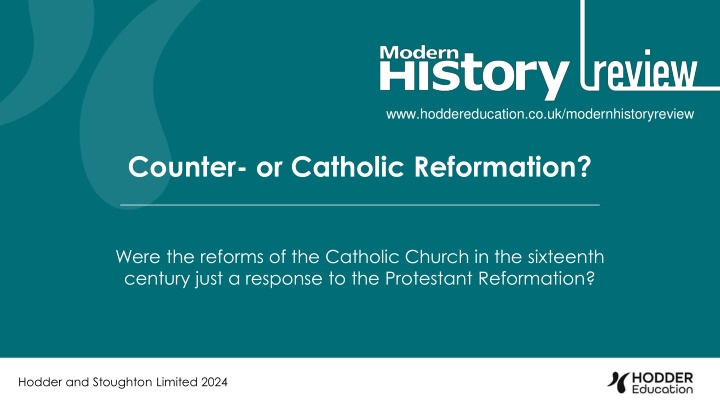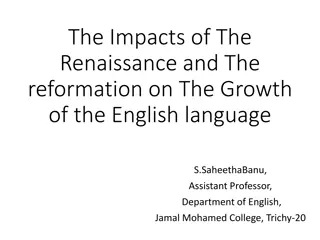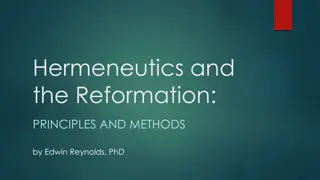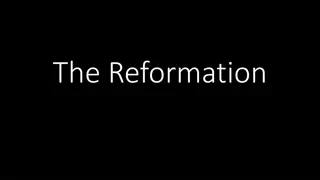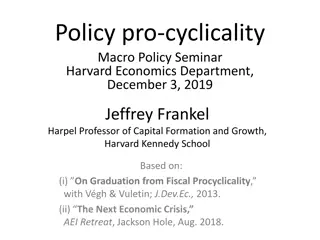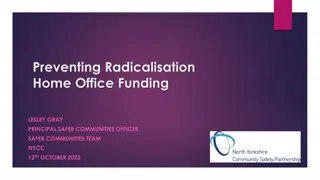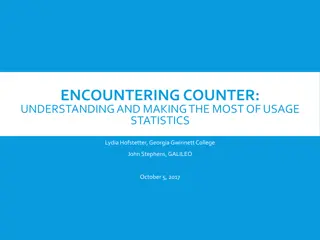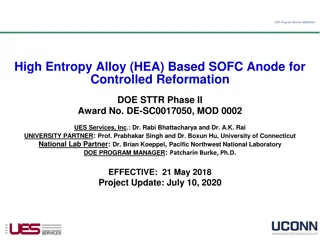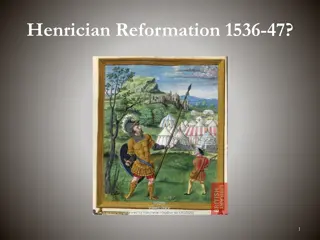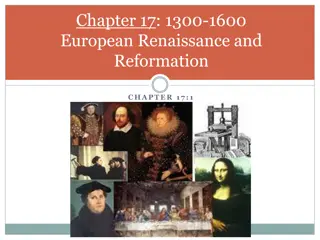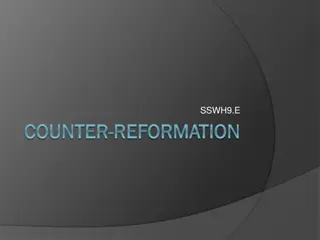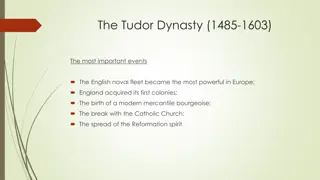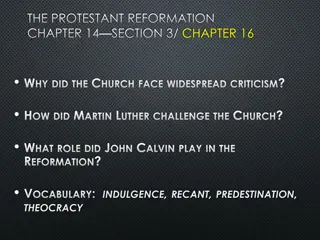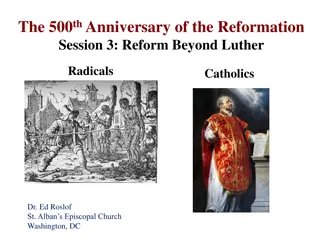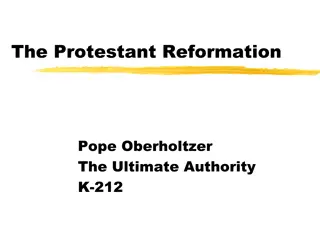Counter- or Catholic Reformation?
The debate surrounding the Catholic Reformation questions whether it was a self-initiated response to internal factors or a reaction to the Protestant Reformation. Historians differ on when reform truly began, with some arguing it started before Luther. Key questions include whether the Catholic Church would have reformed without Lutheranism and if a spiritual revival was necessary for the Church to respond to Luther’s challenge.
Download Presentation

Please find below an Image/Link to download the presentation.
The content on the website is provided AS IS for your information and personal use only. It may not be sold, licensed, or shared on other websites without obtaining consent from the author.If you encounter any issues during the download, it is possible that the publisher has removed the file from their server.
You are allowed to download the files provided on this website for personal or commercial use, subject to the condition that they are used lawfully. All files are the property of their respective owners.
The content on the website is provided AS IS for your information and personal use only. It may not be sold, licensed, or shared on other websites without obtaining consent from the author.
E N D
Presentation Transcript
www.hoddereducation.co.uk/modernhistoryreview Counter- or Catholic Reformation? Were the reforms of the Catholic Church in the sixteenth century just a response to the Protestant Reformation? Hodder and Stoughton Limited 2024
The Counter-Reformation The term Counter-Reformation was first used by Johann Stephan Putter in 1776 to describe the reaction to Lutheranism. It was popularised by Leopold von Ranke to show the supposed negative and reactionary character of Catholic policy. Hodder and Stoughton Limited 2024
What is the debate? Was internal change within the Catholic Church started by itself, without the efforts of Luther and Calvin? This view argues that it was not motivated by a fear that Protestantism might become the dominant religion in Europe. The process of reform had already started in the fifteenth century, predating the attacks by Luther and Calvin. Reform was motivated by a resurgence of spirituality. Hodder and Stoughton Limited 2024
What is the debate? Counter view is that when the Catholic Church realised its errors, it called a council (Trent) to decide on reforms and how to counter Protestantism. Hodder and Stoughton Limited 2024
What is the debate? The key questions: Would the the Catholic Reformation have taken place without the emergence of Lutheranism? If the spiritual revival had not been underway, would the Catholic Church have been able to respond to Luther s challenge? Hodder and Stoughton Limited 2024
What is the debate? The debate centres around when reform really started and ended. Historians differ on this: A. G. Dickens argues that it starts with Luther. Owen Chadwick sees the start in the 1550s with Trent. M. Mullett sees origins in medieval period. J. Bossy sees roots of reform over long term. P. Janelle and H. Jedin argue reform without the Protestant Reformation. Hodder and Stoughton Limited 2024
Was there a spirit of reform before the Protestant Reformation? There are a number of developments which support the view that reform was already being considered before 1517: Church councils at Basel and Florence in the fifteenth century. Councils had started reform programmes. Emphasis on the value of resident clergy for pastoral and sacramental duties. Some popes led by example Eugenius IV and Nicholas V. Some monastic orders returned to more orthodox practices, and observant orders refounded. Hodder and Stoughton Limited 2024
Was there a spirit of reform before the Protestant Reformation? Several religious groups had been formed in the 1520s, influenced by the same ideas as Luther: they wanted to purify the Church of its abuses. This included: Capuchins Oratory of Divine Love Ursulines Theatines Pierre Janelle has used this to show the Catholic Church was capable of reforming itself. Hodder and Stoughton Limited 2024
Was there a spirit of reform before the Protestant Reformation? The argument that reform predates the attacks by Luther and Calvin argues that The Renaissance , with its re-examination of traditional ideas, had a reforming impact on the Church, just as much as art and architecture. Hodder and Stoughton Limited 2024
Was there a spirit of reform before the Protestant Reformation? This is certainly the view of Jean Delumeau, focused on the spiritual dimension, changing beliefs and behaviour of ordinary church members. He argued the changes brought about by both reformations led to the Christianisation of the Church. Mechanistic practices were replaced by a religion based on faith and commitment. Hodder and Stoughton Limited 2024
Was there a spirit of reform before the Protestant Reformation? Establishment of oratories (Genoa). Work of Isabella and Ferdinand in Spain. Establishment of Inquisition to deal with Muslims and Jewish people in Spain. However, there was concern that it was not enough. Hodder and Stoughton Limited 2024
Was there a spirit of reform before the Protestant Reformation? Difficult to argue against, as: Without it, the Catholic Church would have been unable to respond to Luther s challenge. The challenge of Luther provided the focus for the response. The Lutheran challenge gave the movement a sense of urgency. Hodder and Stoughton Limited 2024
How successful were the reforms? Cardinal Giles Viterbo at the opening of the Lateran Council in 1512, stated: Unless by the council or some other means we place a limit on our morals, unless we force our greedy desire for human things, the source of evils, to yield to the love of divine things, it is all over with Christendom. Hodder and Stoughton Limited 2024
How successful were the reforms? All Popes since 1471 had promised to call a general council, but none had. It was not until 1545, despite Luther s attack, that a general council did meet. Hodder and Stoughton Limited 2024
How successful were the reforms? Only in Italy did the early new orders appear to have any impact. Not much substance to work of new orders. Key to reform was the Papacy there s little evidence of willingness to reform, seen in Julius II and Leo X, who were not only obstacles to reform, but behaved badly, typifying corruption and abuses that led to the Reformation. Hodder and Stoughton Limited 2024
A Counter-Reformation? The main ideas for this argument are: Reform really only starts with success of Lutheranism. Reform only apparent with Trent and after. Work of Hubert Jedin, focused on political role of the Papacy and Trent, therefore little consideration of spirituality. Hodder and Stoughton Limited 2024
A Counter-Reformation? Trent was largely a response to Lutheranism. Quality of Papal office changes. Index. Institutional reform. Clear doctrine, which puts clear blue water between Catholicism and Protestantism. Role of Bishops. Education. Regain lands lost to Protestantism. Inquisition? Hodder and Stoughton Limited 2024
Conclusion In answering whether it was a Catholic or Counter-Reformation, Dickens has argued it was quite obviously both . Hodder and Stoughton Limited 2024
